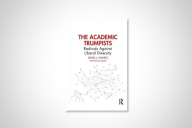You have /5 articles left.
Sign up for a free account or log in.
Colleges are under a lot of pressure and scrutiny -- from parents, legislators and Congress, among others -- about how ably and quickly they respond to emergencies. To the extent they fall short and need help, though, it tends to be in how they get the word out to students in times of trouble and how capably they respond to tragedies. Finding out about the impending crisis -- a terrorist threat, an environmental catastrophe, or a pending hurricane, to choose one current example -- tends not to be a problem, given all the sources of information available to us mere mortals, let alone security professionals.
Which is why the federal government's decision to send "public alert" radios to the presidents of all two- and four-year public and private colleges in recent days was perplexing to some of those who received the devices. The distribution was part of a larger program (financed with "special funding" from Congress, according to a letter that accompanied the radios) in which the Departments of Homeland Security, Education, Commerce and Health and Human Services are providing the National Oceanic and Atmospheric Agency's Public Alert Radios to educational institutions from preschools through colleges. ("With 24/7 capability and battery backup, the radio is always on guard to alert you to severe weather conditions, terrorist threats, and other emergencies in your immediate area, even when other communication lines are unavailable," a federal Web site about the program says.)
"In addition to preparing staff, students, and school communities for emergencies, this access to alerts and warnings will provide you with the information you need to respond quickly and appropriately should an incident develop," the federal agencies said in the letter that accompanied the small white devices. Colleges and schools are not required to participate in the program, but if they don't opt out, they are required to register the devices with the government.
Several college presidents who received the radios said they appreciated the gesture but wondered whether it was the best use of scarce federal dollars -- even if the government was intent on helping make campuses more secure. (Exactly how much the program cost the U.S. Treasury isn't clear, but a news release from the Federal Emergency Management Agency says the radios are being distributed to 180,000 educational institutions. The Georgia-based maker of the radios that at least some colleges received, Reecom Electronics, Inc., says they cost $59.99, but that a "whole sale price" is available to the federal government.)
Patricia McGuire, president of Trinity Washington University, said her campus's security officials had determined the device to be of "very limited utility," given its redundance with other equipment and sources of emergency information the institution already has.
"We surely appreciate the thought, but if there were a federal grant program to improve security on college campuses, a weather alert radio would be far down the list of our real needs," McGuire said in an e-mail message. "We’d like to see substantial support for improved rapid communication systems throughout the campus, and with the police and other agencies responsible to work with us on security issues; we’d like to see federal grant support for improved camera and building access systems, improved fire safety systems, electrical generation, and acquisition of equipment that could really help us to protect our campus if there were a serious terrorist act in Washington, e.g., biological or nuclear contamination, destruction of drinking water supplies.
"Seven years after September 11," she continued, "while we all have improved individual campus emergency plans and many cross-institutional discussions about backing each other up in emergencies, we still seem to have no real governmental plan (federal or local) to work with large institutions should we need to shelter-in-place, deliver emergency supplies to people held on campus, or should we have to evacuate. After all the time and all of the discussions, and all of our private investments in improving campus safety, it’s just curious that we would get a 'free' weather radio as a device for disaster planning."









